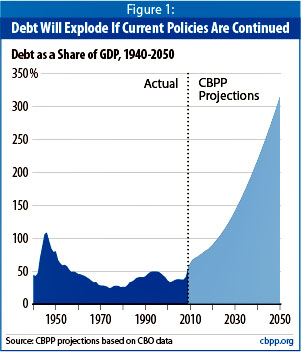 The White House has cut a deal to create a shiny new “deficit commission” that will report back later this year on ways to get the federal budget under control. Unfortunately, there are lots of reasons to think that this is either worthless or the next best thing. Let’s count the ways:
The White House has cut a deal to create a shiny new “deficit commission” that will report back later this year on ways to get the federal budget under control. Unfortunately, there are lots of reasons to think that this is either worthless or the next best thing. Let’s count the ways:
- Jon Chait points out that Republicans aren’t on board: “A grand compromise to raise taxes and reduce spending would be a terrific thing. The Democrats are just delusional if they think this commission will produce it. Read the story again — it’s an agreement between Obama and Congressional Democrats. There’s just no way the GOP, which is calling for more tax cuts and demanding that Obama preserve even the waste in Medicare, will buy in.” True. In fact, most conservatives still refuse even to accept the fact that our skyrocketing deficit is mostly the fault of GOP policies from the Bush years, and congressional Republicans are already under pressure not to support any commission that doesn’t take tax hikes off the table up front. This is not a recipe for a reality-based recommendation.
- That 1982-83 Social Security commission that’s the model for this one? Turns out it didn’t work. Stan Collender glosses a New York Times account from Monday: “Former Social Security Commissioner Robert Ball, one of the Greenspan Commission’s most prominent Democrats, has written in a yet-to-be-published memoir that the commission wasn’t able to agree to anything. Instead, Reagan and House Speaker Tip O’Neill, neither of who were members of the commission, privately agreed to a deal. The Greenspan Commission was pushed to take credit for it so that it looked more bipartisan-partisan and less of a backroom deal that was really the case.”
- Paul Krugman points out that even the agreement we did get from the Greenspan commission wasn’t so hot. To paraphrase: the 1984 deal raised payroll taxes (which are paid primarily by the middle class) and provided breathing room to maintain cuts to the income tax (which are paid primarily by the well off). The basic bargain was that this would be reversed in a few decades: starting around 2020 or so, income taxes would have to be raised in order to pay off the trust fund while keeping payroll taxes steady. Whether you like the deal or not (I don’t, especially), that was the deal. More here. But as Krugman points out, Republicans have pressed ever since to abrogate it halfway through, pretending that the trust fund is just a “shell game.” In other words, now that the middle class has spent three decades paying for their half of the deal, the wealthy want to be let off the hook for their half — and Republicans support them. They’d probably do the same with a deficit commission.
- It probably won’t work anyway. The commission’s recommendations are just….recommendations. The House and Senate still have to vote to approve them, and they’re free to amend or filibuster them just like any other proposal. The politics of deficit reduction stay exactly the same, commission or no commission.
I’m probably missing some basic problems, but four is enough. I guess this is good fodder for Obama’s upcoming State of the Union address, and probably also a good way to keep this stuff off the table until after the midterm elections, but that’s about it. This is all about optics, not reality.













